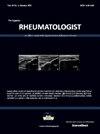Cognitive function impairment in patients with antiphospholipid syndrome: Association with clinical, laboratory and brain magnetic resonance imaging findings
IF 1
Q4 RHEUMATOLOGY
引用次数: 0
Abstract
Background
Cognitive dysfunction is frequent in patients with antiphospholipid syndrome (APS) although not included in the classification criteria.
Aim of the work
To assess the cognitive function in APS patients and to study any relation to clinical, laboratory and brain magnetic resonance imaging (MRI) findings.
Patients and methods
This study was conducted on 113 patients: 30 with primary APS, 44 secondary APS and 39 systemic lupus erythematosus (SLE) patients without APS. Cognitive function was assessed using Mini-Mental State Examination (MMSE) and Montreal cognitive assessment-Basic (MOCA-B). APS clinical manifestations, disease damage indices, APS immunological profile and MRI abnormalities were recorded.
Results
Of the 74 APS patients, 70 (94.6 %) were females. Their mean age was 32.3 ± 8 years and mean disease duration was 9.4 ± 5.9 years. Cognitive impairment was significantly higher in APS patients (n = 44, 59.9 %) than in SLE patients without APS (n = 2, 5.1 %) when assessed by MOCA-B (p < 0.001). There was no significant difference between primary and secondary APS subtypes as regards cognitive impairment assessed by MMSE (0 vs 3) and MOCA-B (17 vs 27p = 0.81). The presence of cognitive impairment was associated with neuropsychiatric manifestations (p < 0.0001); seizures (p = 0.01), TIAs (p = 0.04), migraine/headache (p = 0.03), ACL (p = 0.02), anti-β2GP (p < 0.001), triple positivity of APL (p = 0.002), abnormal brain MRI (p = 0.002) and brain infarcts. A significant negative correlation was found between MOCA-B and cumulative damage of APS (r = 0.5, p < 0.001).
Conclusion
Cognitive impairment was detected in APS patients especially those with neuropsychiatric manifestations, positive ACL, anti- β2GP and triple positivity of APL or abnormal brain MRI.
抗磷脂综合征患者的认知功能障碍:与临床、实验室和脑磁共振成像结果的关系
背景:认知功能障碍在抗磷脂综合征(APS)患者中很常见,但不包括在分类标准中。目的评估APS患者的认知功能,并研究其与临床、实验室和脑磁共振成像(MRI)结果的关系。患者与方法本研究共纳入113例患者,其中原发性APS患者30例,继发性APS患者44例,无APS的系统性红斑狼疮(SLE)患者39例。认知功能评估采用简易精神状态检查(MMSE)和蒙特利尔认知评估-基本(MOCA-B)。记录APS临床表现、疾病损害指标、APS免疫学特征及MRI异常。结果74例APS患者中,女性70例(94.6%)。平均年龄32.3±8岁,平均病程9.4±5.9年。经MOCA-B评估,APS患者的认知功能障碍(n = 44, 59.9%)明显高于无APS的SLE患者(n = 2, 5.1%) (p <;0.001)。在MMSE (0 vs 3)和MOCA-B (17 vs 27p = 0.81)评估的认知障碍方面,原发性和继发性APS亚型之间无显著差异。认知障碍的存在与神经精神表现相关(p <;0.0001);发作(p = 0.01), tia (p = 0.04),偏头痛、头痛(p = 0.03), ACL (p = 0.02),反-β2 gp (p & lt;0.001), APL三阳性(p = 0.002),脑MRI异常(p = 0.002)和脑梗死。MOCA-B与APS累积损伤呈显著负相关(r = 0.5, p <;0.001)。结论APS患者存在认知功能障碍,尤其是有神经精神表现、ACL阳性、抗β2GP、APL三重阳性或脑MRI异常的患者。
本文章由计算机程序翻译,如有差异,请以英文原文为准。
求助全文
约1分钟内获得全文
求助全文

 求助内容:
求助内容: 应助结果提醒方式:
应助结果提醒方式:


